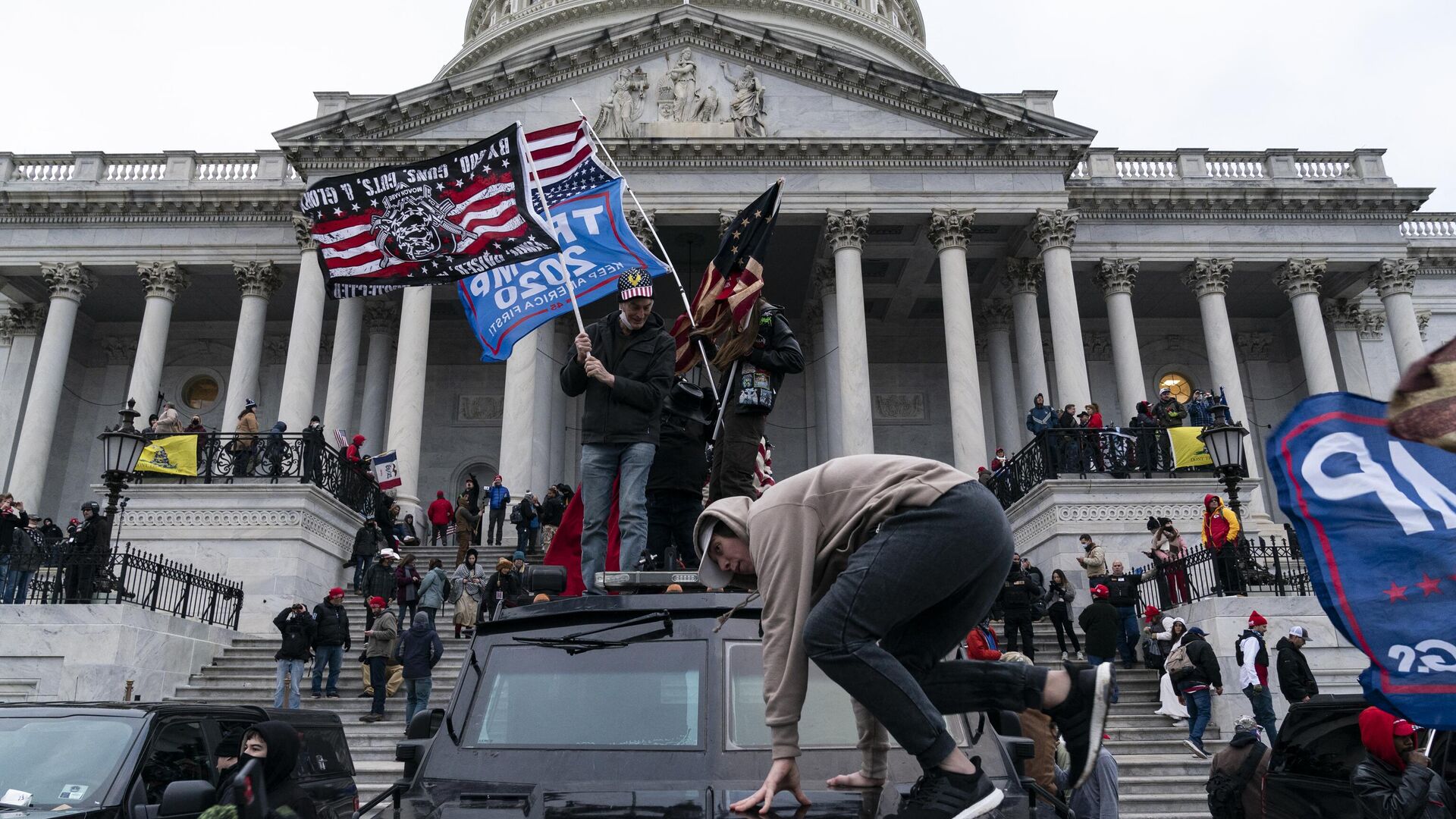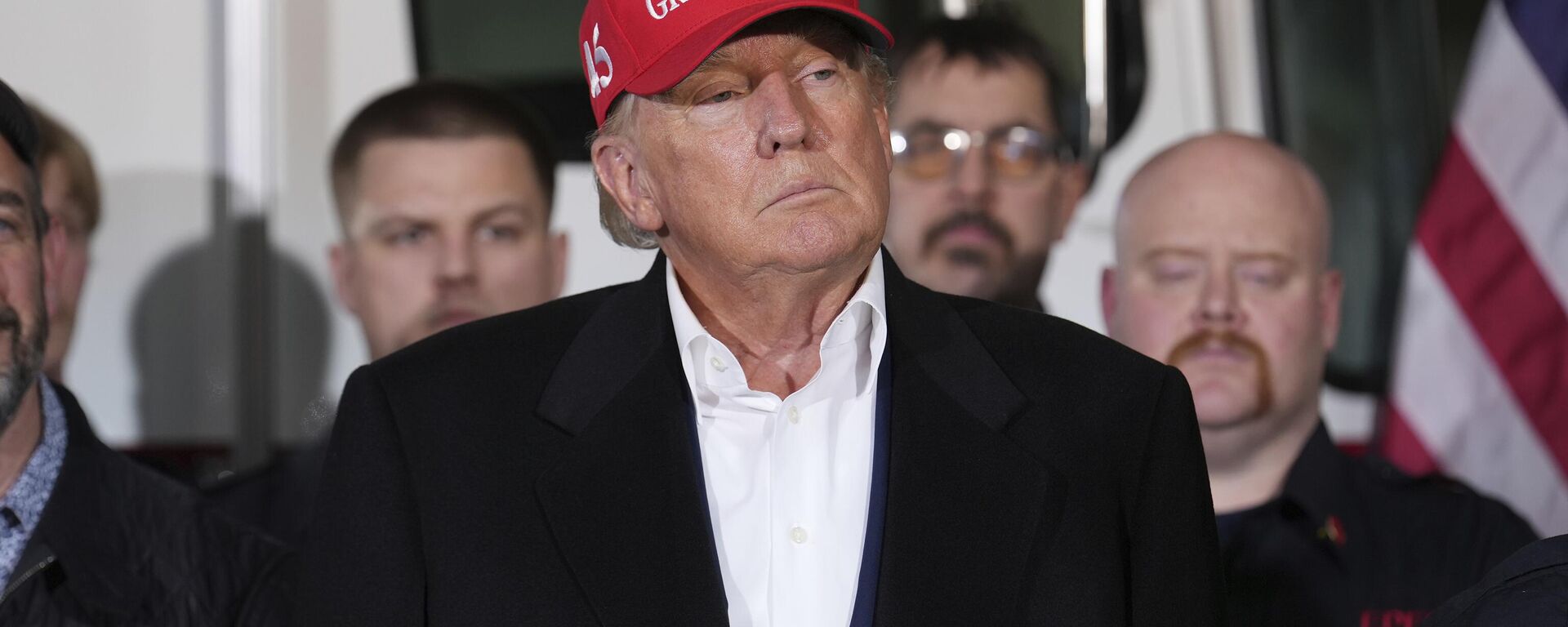https://sputnikglobe.com/20230602/the-overzealous-prosecutors-of-january-6th-1110851230.html
The Overzealous Prosecutors of January 6th
The Overzealous Prosecutors of January 6th
Sputnik International
“Government is an institution which prevents injustice other than such as it commits itself.” Draconian prison sentences handed down to those involved in the January 6, 2021 Capitol riot highlight this truism.
2023-06-02T02:46+0000
2023-06-02T02:46+0000
2023-06-02T02:41+0000
analysis
nancy pelosi
us department of justice
democrats
doj
https://cdn1.img.sputnikglobe.com/img/07e7/05/04/1110093195_0:160:3072:1888_1920x0_80_0_0_3bac04b6ec667cfa8d811605e5098dfc.jpg
Though he didn’t enter the Capitol that day, Oath Keepers leader Stewart Rhodes, 57, received 18 years in federal prison for seditious conspiracy under a law whose retrograde origins and vague definition ought to worry those who care about due process. Florida chapter leader Kelly Megg will serve 12 years for the same offense. Peter Schwartz, 49, who attacked police officers at the Capitol with a chair and then chemical spray, got 14 years. Richard Barnett, who was photographed with his feet resting on then-House Speaker Nancy Pelosi’s desk, received 4.5 years. The US Department of Justice has obtained prison sentences in at least 250 of the thousand-plus January 6th-related cases it is prosecuting. The DOJ is also undermining defendants’ ability to hire attorneys by asking judges to issue fines big enough to offset donations to legal-defense funds.Like most Americans, I am disgusted by the events of January 6th. The rioters rioted without cause even to protest; there was insufficient evidence of irregularities in the 2020 election to believe US President Joe Biden hadn’t won.Many of them succumbed to idiotic nonsense; they believed in QAnon and Pizzagate. Too many were xenophobic, racist, homophobic partisans of the far-right, the embodiment of what the historian Richard Hofstadter described as the paranoid style in American politics. Rhodes, who also participated in the 2014 standoff by far-right anti-government extremists at the Bundy Ranch, would probably despise me and my left-wing politics. (Though, you never know. Rhodes’ Oath Keepers supported Edward Snowden.)I abhor the defendants and their politics, as well as their actions on January 6th. Yet I can see that the events of that day, shocking as they were, have been exaggerated by Democrats and their media allies in order to gain partisan advantage. Now, they are being punished beyond reason.A reasonable person cannot conclude that these punishments fit the crime. The average prison term for a person convicted of murder in the United States is 17.5 years. The average term for rape is seven years. Nothing Rhodes did, in the aggregate, comes close to taking a life—yet he will go behind bars for the same period of time as a stone-cold killer. Appropriate January 6th charges would include burglary, trespassing and vandalism and, in cases like those who called for violence against government officials, menacing. Rhodes, however, was sentenced as a terrorist.His real offense was challenging the authority of the government at its seat of power.The riot caused $1.5 million worth of damage to the Capitol building, the same amount New York City paid to renovate a nondescript children’s playground in Harlem. One Capitol Hill police officer died, the following day. The coroner attributed his passing to natural causes; prosecutors did not file charges against anyone in that incident. One cop lost the tip of a finger and others suffered concussions—unacceptable to be sure, yet far short of what one might expect. As riots and insurrections go, video and photo evidence make clear that January 6th was hardly the full-scale attempt to overthrow the republic portrayed by Democrats.Charges and convictions were appropriate, just not at this level. Yearslong sentences against nonviolent offenders suggests that prosecutors were less interested in holding wrongdoers accountable than sending an unmistakable message: don’t mess with us.The prosecution of Barnett, the man who invaded Pelosi’s office, notes that he left her a message calling her a “b***h.” “Court documents also state that Barnett had a stun gun in his pants while in the speaker’s office and that he took an envelope from the office,” US media reported. “Prosecutors said he left the Capitol showing the envelope to other rioters like it was a ‘trophy.’” An unused stun gun? A crude message? An envelope? Four and a half years?Cesare Beccaria’s 1764 manifesto On Crime and Punishments set a philosophical ideal for justice in Western Europe, a standard enshrined in constitutions that was so influential it inspired the title of Dostoevsky’s great novel. When prosecutors and judges impose excessively harsh punishments, they cede the moral high ground to those they seek to condemn. The convicted are transformed into aggrieved parties while the government feeds into their narrative that it is vindictive and oppressive. “I consider every J-6er to be a political prisoner because all of them are grossly overcharged,” Stewart Rhodes told US District Judge Amit Mehta at his sentencing hearing.“You’re not a political prisoner, Mr. Rhodes,” the judge retorted.Of course he is.(Ted Rall (Twitter: @tedrall), the political cartoonist, columnist and graphic novelist, co-hosts the left-vs-right DMZ America podcast with fellow cartoonist Scott Stantis. You can support Ted’s hard-hitting political cartoons and columns and see his work first by sponsoring his work on Patreon.)
https://sputnikglobe.com/20230303/trump-stuns-after-dropping-musical-collab-with-capitol-riot-prisoners-in-justice-for-all-song-1107996989.html
Sputnik International
feedback@sputniknews.com
+74956456601
MIA „Rossiya Segodnya“
2023
Ted Rall
https://cdn1.img.sputnikglobe.com/img/07e5/02/13/1082125340_0:0:360:360_100x100_80_0_0_1ed1a3494a53cde87e19521c3658fe92.jpg
Ted Rall
https://cdn1.img.sputnikglobe.com/img/07e5/02/13/1082125340_0:0:360:360_100x100_80_0_0_1ed1a3494a53cde87e19521c3658fe92.jpg
News
en_EN
Sputnik International
feedback@sputniknews.com
+74956456601
MIA „Rossiya Segodnya“
Sputnik International
feedback@sputniknews.com
+74956456601
MIA „Rossiya Segodnya“
Ted Rall
https://cdn1.img.sputnikglobe.com/img/07e5/02/13/1082125340_0:0:360:360_100x100_80_0_0_1ed1a3494a53cde87e19521c3658fe92.jpg
january 6, capitol riot, sentencing, charges
january 6, capitol riot, sentencing, charges
The Overzealous Prosecutors of January 6th
“Government,” observed the 14th century Arab political theorist Ibn Khaldoun, “is an institution which prevents injustice other than such as it commits itself.” Draconian prison sentences handed down to those involved in the January 6, 2021 Capitol riot highlight this truism.
Though he didn’t enter the Capitol that day, Oath Keepers leader Stewart Rhodes, 57, received
18 years in federal prison for seditious conspiracy under a law whose retrograde origins and
vague definition ought to worry those who care about due process.
Florida chapter leader Kelly Megg will serve
12 years for the same offense. Peter Schwartz, 49, who attacked police officers at the Capitol with a chair and then chemical spray, got
14 years. Richard Barnett, who was photographed with his feet resting on then-House Speaker Nancy Pelosi’s desk, received
4.5 years.
The US Department of Justice has obtained prison sentences in at least 250 of the
thousand-plus January 6th-related cases it is prosecuting. The DOJ is also undermining defendants’ ability to hire attorneys by
asking judges to issue fines big enough to offset donations to legal-defense funds.
Like most Americans, I am disgusted by the events of January 6th. The rioters rioted without cause even to protest; there was insufficient evidence of irregularities in the 2020 election to believe US President Joe Biden hadn’t won.
Many of them succumbed to idiotic nonsense; they believed in QAnon and Pizzagate. Too many were xenophobic, racist, homophobic partisans of the far-right, the embodiment of what the historian Richard Hofstadter described as
the paranoid style in American politics. Rhodes, who also
participated in the 2014 standoff by far-right anti-government extremists at the Bundy Ranch, would probably despise me and my left-wing politics. (Though, you never know. Rhodes’ Oath Keepers supported
Edward Snowden.)
I abhor the defendants and their politics, as well as their actions on January 6th. Yet I can see that the events of that day, shocking as they were, have been exaggerated by Democrats and their media allies in order to gain partisan advantage. Now, they are being punished beyond reason.
A reasonable person cannot conclude that these punishments fit the crime. The
average prison term for a person convicted of murder in the United States is 17.5 years. The average term for rape is seven years. Nothing Rhodes did, in the aggregate, comes close to taking a life—yet he will go behind bars for the same period of time as a stone-cold killer.
Appropriate January 6th charges would include burglary, trespassing and vandalism and, in cases like those who called for violence against government officials, menacing. Rhodes, however, was
sentenced as a terrorist.
His real offense was challenging the authority of the government at its seat of power.
Prosecutorial discretion and the inherent non-uniformity of sentencing judges ensure that there will be a range of prison terms for defendants convicted of similar offenses, and that certain crimes that seem less serious will result in harsher verdicts.
But a criminal justice system worthy of its name should strive for internal consistency and fairness whether its overall tenor is lenient or harsh. The January 6th sentences do not meet that standard.
The riot caused
$1.5 million worth of damage to the Capitol building, the same amount New York City paid to
renovate a nondescript children’s playground in Harlem. One Capitol Hill police officer died, the following day. The coroner attributed his passing to
natural causes; prosecutors did not file charges against anyone in that incident.
One cop lost the tip of a finger and others suffered concussions—unacceptable to be sure, yet far short of what one might expect. As riots and insurrections go, video and photo evidence make clear that January 6th was hardly the full-scale attempt to overthrow the republic portrayed by Democrats.
Charges and convictions were appropriate, just not at this level. Yearslong sentences against nonviolent offenders suggests that prosecutors were less interested in holding wrongdoers accountable than sending an unmistakable message: don’t mess with us.
The prosecution of Barnett, the man who invaded Pelosi’s office, notes that he left her a message calling her a “b***h.” “Court documents also state that Barnett had a stun gun in his pants while in the speaker’s office and that he took an envelope from the office,” US media
reported. “Prosecutors said he left the Capitol showing the envelope to other rioters like it was a ‘trophy.’”
An unused stun gun? A crude message? An envelope? Four and a half years?
Cesare
Beccaria’s 1764 manifesto On Crime and Punishments set a philosophical ideal for justice in Western Europe, a standard enshrined in constitutions that was so influential it inspired the title of Dostoevsky’s great novel.
“In order that punishment should not be an act of violence perpetrated by one or many upon a private citizen,” Beccaria concluded, “it is essential that it should be…the minimum possible in the given circumstances.”
When prosecutors and judges impose excessively harsh punishments, they cede the moral high ground to those they seek to condemn. The convicted are transformed into aggrieved parties while the government feeds into their narrative that it is vindictive and oppressive. “I consider every J-6er to be a political prisoner because all of them are grossly overcharged,” Stewart Rhodes
told US District Judge Amit Mehta at his sentencing hearing.
“You’re not a political prisoner, Mr. Rhodes,” the judge
retorted.
(Ted Rall (Twitter: @tedrall), the political cartoonist, columnist and graphic novelist, co-hosts the left-vs-right DMZ America podcast with fellow cartoonist Scott Stantis. You can support Ted’s hard-hitting political cartoons and columns and see his work first by sponsoring his work on Patreon.) 



